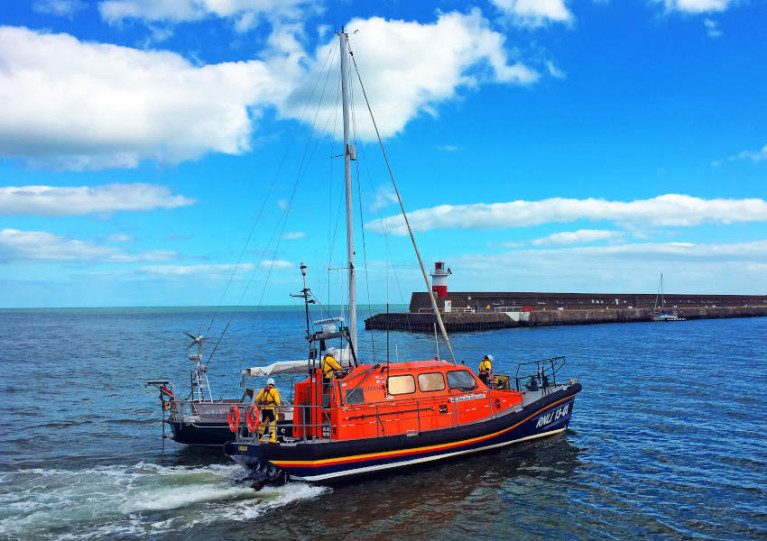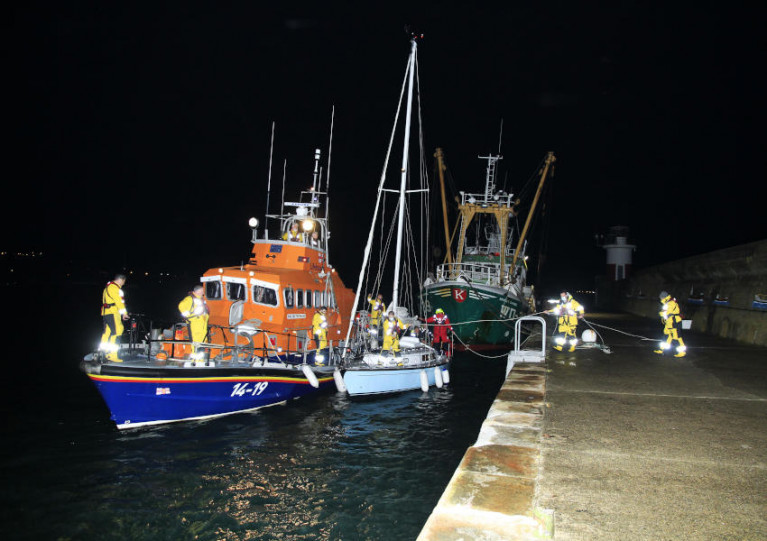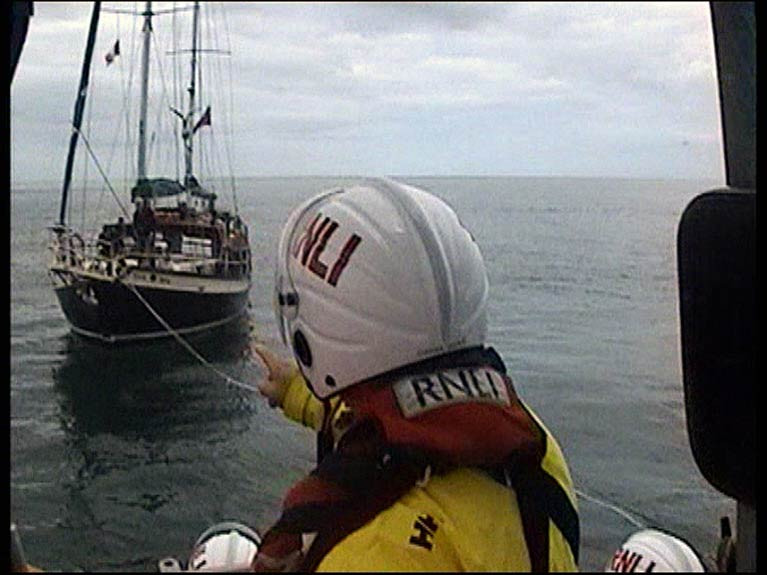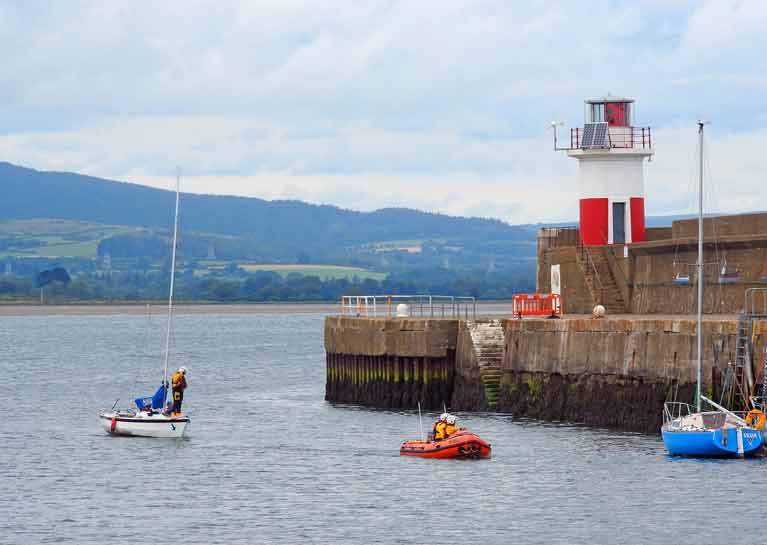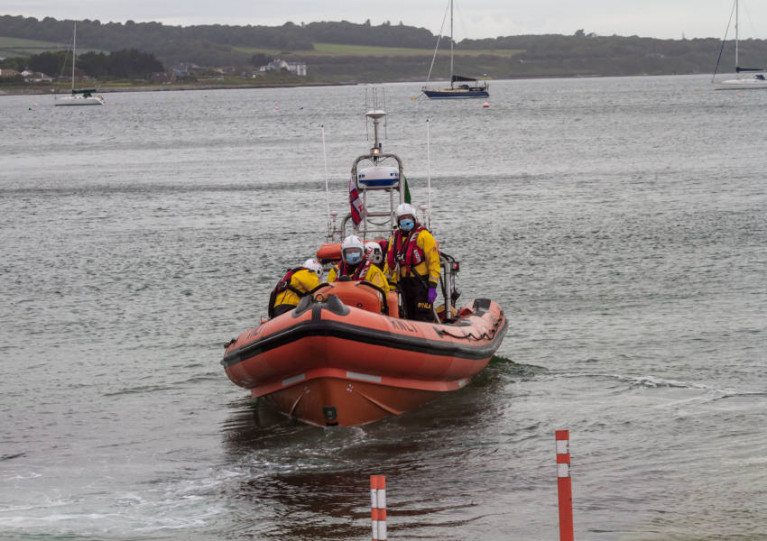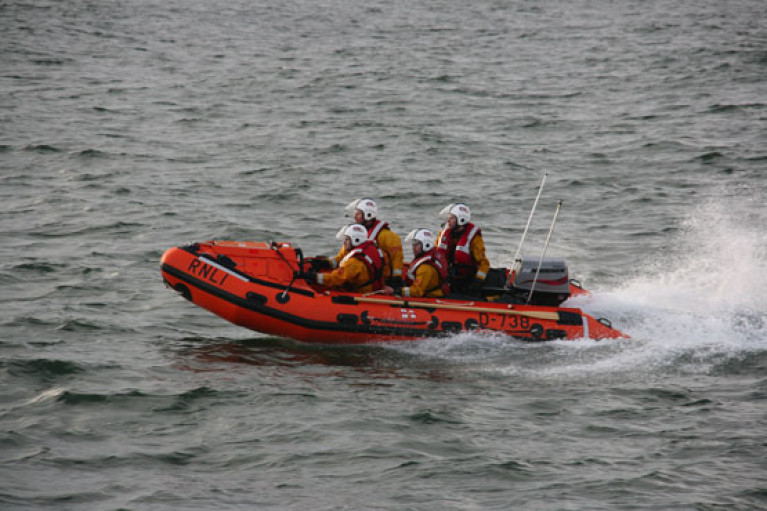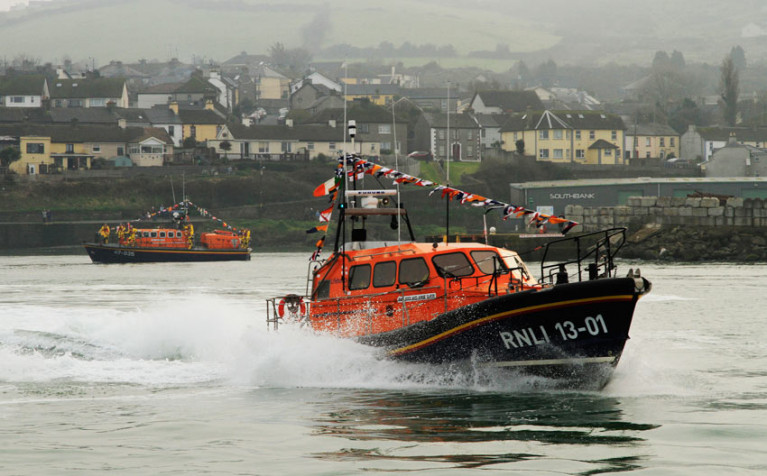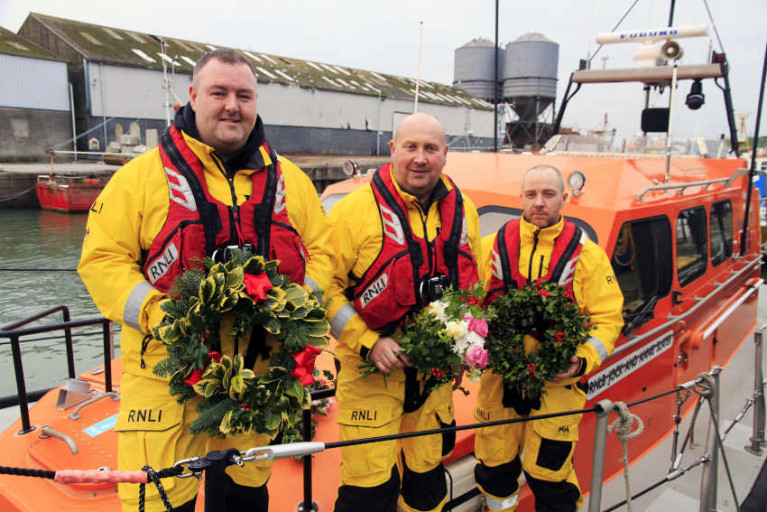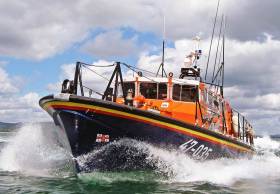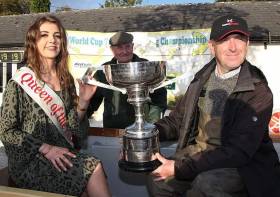Displaying items by tag: Wicklow
Wicklow Lifeboat Assists Yacht With Engine Failure
Wicklow RNLI’s all-weather lifeboat had a midweek launch to assist two sailors on a 14-metre yacht with engine failure off the Wicklow coast.
The Shannon class lifeboat set off shortly after 1pm on Wednesday 9 September and located the yacht 20 minutes later, six miles north of Wicklow Harbour.
Conditions on scene had a moderate sea state with northwesterly Force 4 winds.
A towline was quickly established and the yacht was towed back towards Wicklow harbour, where the two sailors were landed safely ashore at 2.30pm.
The crew on the callout were coxswain Ciaran Doyle, mechanic Brendan Copeland, David O’Leary, Carol Flahive, Ian Heffernan and Andrew Carlin.
It was a long night at sea for Arklow RNLI on Tuesday evening (4 August) as its volunteers launched to assist three people on a yacht in difficulty in the Irish Sea some 25 miles off the Co Wicklow town.
The yacht was intercepted just north of the Arklow Bank amid swells of up to five metres, and its crew were suffering from fatigue and sea sickness.
Worsening conditions meant the yacht was not able to make headway either by sail or its own engine tower, so it was taken under tow by the lifeboat to Wicklow Harbour as the safest and shortest option — eventually arriving at 1.15am, more than six hours after launch.
Lifeboat coxswain Brendan Dillon commented: “Given the prevailing conditions at sea, this could have ended very differently.”
Wicklow RNLI Launch to Assist Yacht with Mechanical Problems
Wicklow all-weather RNLI lifeboat launched shortly after 12:45 pm today (Saturday 1 August) following a Coast Guard launch request, to assist a 14-metre ketch with four people onboard near Greystones.
The drifting yacht was located 30 minutes later by Coxswain Doyle and the volunteer crew three miles south of Greystones harbour.
The engine had failed and there was not enough wind to use the sails to get to shore, so the skipper contacted the Coast Guard for assistance. Conditions on scene were calm with good visibility.
A towline was quickly established, and the yacht was towed into Greystones Marina, where the three adults and a child were landed safely ashore.
The crew on the call out were (2nd) Coxswain Ciaran Doyle, Mechanic Brendan Copeland, Carol Flahive, Paul Sillery, Mark Kavanagh and Peter Byrne
Yacht with Two Onboard Brought to Safety by Wicklow RNLI
A 20ft sailing yacht with two people onboard was brought to safety by Wicklow RNLI this afternoon (Sunday 12 July).
The inshore lifeboat launched at 11:45 am with Graham Fitzgerald (helm) and crew Alan Goucher and John Stapleton to reports of a small yacht in difficulty.
The yacht was located four minutes later one mile east of Wicklow harbour, weather conditions at the time were described as sea state slight with force three southerly wind.
Volunteer crew member Alan Goucher was transferred onto the yacht to assist the two sailors after they experienced problems with the mast and their outboard engine failed.
A towline was established and the yacht with two sailors was brought safely alongside the East pier at Wicklow harbour at 12:15 pm.
Second Yacht in Difficulty off Wicklow
This was the second callout for Wicklow RNLI volunteers over the weekend. On Saturday evening Wicklow all-weather lifeboat launched shortly after 7 pm under the command of Coxswain Nick Keogh, to join Arklow lifeboat and the Dublin based Coast Guard helicopter ‘Rescue 116’ in a search for a yacht in difficulties.
The initial reports suggested the yacht's position was nine miles south between Wicklow head and the Arklow wind farm.
Wicklow lifeboat was stood down by the Coast Guard and returned to station at 7:45 pm after the stricken yacht was located by Rescue 116 near Courtown and assisted by Arklow lifeboat.
Skerries Lifeboat Tows Jet Ski To Safety After Breakdown
Skerries RNLI volunteers towed a jet ski with a man and woman on board to safety after they broke down near Barnageeragh beach in North Co Dublin.
Shortly after 5pm yesterday evening (Friday 26 June), the volunteers launched the Atlantic 85 inshore lifeboat following a 999 call to Dublin Coast Guard from a jet ski that had broken down.
They located the casualty in shallow water near a large rocky outcrop between Barnageerah and Balbriggan.
The man and woman were taken on board the lifeboat while the jet ski was taken under tow, and they were returned safely to the slipway at the lifeboat station in Skerries.
Speaking about the callout, volunteer lifeboat press officer Gerry Canning said: “You never know when something is going to go wrong, so we’d like to remind anyone going to sea to carry a means of contacting the shore to call for help.”
Elsewhere, Wicklow RNLI brought three fishermen to safety on Thursday afternoon (25 June) after their 12-metre vessel developed mechanical problems off the Wicklow coast.
The alarm was raised after the vessel which was fishing for whelk broke down and lost all propulsion.
Crew on the all-weather lifeboat Jock & Annie Slater located the stricken vessel about nine miles north of Wicklow Harbour, and towed it back to the harbour where it was brought safely alongside the South Quay.
Portrush RNLI’s lifeboats aided in the rescue of a young man who fell 30 feet onto rocks on the north coast last night (Wednesday 10 June).
Both the inshore and all-weather lifeboats were launched as a precaution due to the nature of the incident, after reports that the man had fallen at Port-Na-Happle just off the Convent Walk, a popular scenic coastal path in Portstewart.
Volunteer lifeboat crew member Dr Colm Watters, who is a consultant at Causeway Hospital’s emergency department, was transferred ashore to assist the local coastguard with the treatment of the casualty before he was passed into the care of the NI Ambulance Service.
Lifeboat operations manager Keith Gilmore said later: “We had the opportunity to do some training with our coastguard colleagues last year and this has paid off in terms of our joint working procedures.
“We are fortunate to have a volunteer with Colm’s expertise on crew and this was invaluable in this incident. We wish the casualty well and hope he has a speedy recovery.”
Earlier in the day, Wicklow RNLI brought three fishermen to safety at lunchtime after their 12-metre vessel got into difficulties off the Wicklow coast.
The alarm was raised earlier in the morning after the fishing boat’s propeller got fouled in ropes near the Codling Buoy.
Crew of the all-weather lifeboat Jock & Annie Slater located the drifting fishing vessel 14 miles east of Wicklow Harbour and quickly established a tow. The boat was safely tied alongside the South Quay at 12:30pm.
Wicklow Lifeboat Brings Four Fishermen To Safety
Wicklow RNLI brought four fishermen to safety yesterday evening (Monday 27 April) after their vessel got into difficulties off the Wicklow coast.
The all-weather lifeboat Jock and Annie Slater put to sea shortly before 7pm under the command of coxswain Nick Keogh and a volunteer crew, following a launch request from the Irish Coast Guard.
The alarm was raised after the skipper of the fishing vessel made contact by VHF radio to report that a rope was fouled in the vessel’s propeller and they had lost all propulsion.
The lifeboat crew located the drifting fishing vessel 30 minutes after launch, nine miles north-east of Wicklow harbour. Conditions on scene were calm, with light wind and good visibility.
A towline was quickly established, and a course was set for Wicklow Harbour where the fishing vessel with its four crew was brought safely alongside the South Quay as darkness fell shortly before 9.30pm.
The lifeboat crew on the callout were coxswain Nick Keogh, mechanic Brendan Copeland, Tom MacAulay, Carol Flahive, Connie O’Gara and Matt Doyle.
Wicklow RNLI Holds Annual New Year’s Service Of Remembrance
Wicklow RNLI held its annual Service of Remembrance on New Year’s Day (Wednesday 1 January) in memory of all deceased lifeboat volunteer members, sailors from the town and all those associated with the sea from Wicklow.
The ceremony began with a short religious prayer conducted by Fr Donal Roche and Rev Jack Kinkead, who blessed the flowers and wreaths.
After the blessing, coxswain Nick Keogh and the lifeboat crew took the floral tributes out into the bay and placed them on the water.
A minute’s silence was also held in memory of all the former members of Wicklow lifeboat who have risked everything to save the lives of others ever since the RNLI lifeboat station was established in 1857.
Three Fishermen Rescued By Wicklow Lifeboat
Wicklow RNLI’s all-weather lifeboat put to sea at 1.20pm on Saturday afternoon (16 November) after being tasked to assist a whelk fishing vessel in difficulties.
The lifeboat, under the command of coxswain Nick Keogh and a volunteer crew, was alongside the drifting vessel half an hour later, some 10 miles south east of Wicklow harbour.
A rope had been fouled in the vessel’s propeller while whelk fishing and it had lost all propulsion.
Weather conditions on scene had a moderate sea state, with winds north-westerly Force 4 and good visibility.
A towline was quickly established and the fishing vessel was towed into Wicklow Harbour, where the three fishermen were landed safely ashore and the boat was secured alongside the south quay at 4.30pm.
The crew on the callout alongside Keogh were mechanic Brendan Copeland, David O’Leary, Lisa O’Leary and John Stapleton.
Fly World Cup Goes To Leitrim Angler After Month-Long Championship
Leitrim angler Bernard Kilkenny claimed the World Cup in trout fly angling on Lough Mask last weekend, as Derek Evans notes in today’s Irish Times.
His five trout at 5.73lb secured the title — as well as a boat with 15HP outboard, and a new rod and reel — in what was “the most drawn-out in the 63 years of the championships”, with poor weather meaning three attempts over a whole month were required.
Elsewhere, two anglers caused a headache for marine wildlife lovers in Wicklow yesterday (Sunday 8 September) when they were spotted fishing just meters from a protected seal colony.
According to Wicklow News, the men had ignored signs warning away from the seals, as well as the pleas of several onlookers, but left the area after they were spoken to by gardaí.
It is recommended that the public stay at least 100 metres away from seals as they enter their breeding season and seek safe space on land from September to the end of the year.



























